35 Business Development Manager Interview Questions You Must Prepare
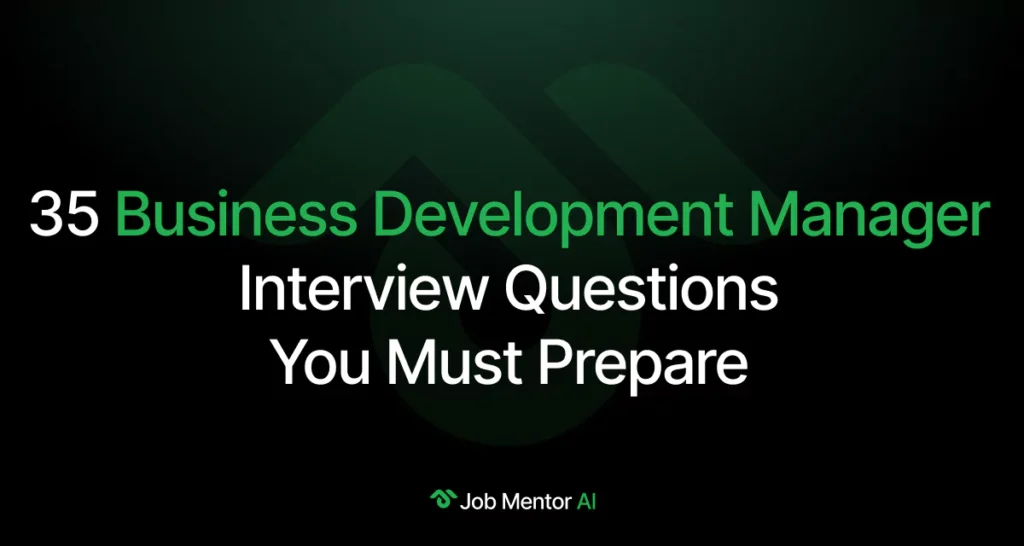
Preparing for a Business Development Manager interview can be a pivotal step towards landing your next big role. Business development is all about driving growth, forging partnerships, and creating opportunities. To help you excel, it’s important to be ready to answer a variety of questions that assess your skills, experience, and approach to business development.
Here, we’ve 35 essential questions you must prepare for, questions for a Business Development Manager interview.
General Business Development Manager Interview Questions
1. Can you tell us a little about yourself and your journey in business development?
2. How do you stay up-to-date with industry trends and innovations?
3. Why did you choose business development as a career path, and what motivates you in this role?
4. How do you define success in a business development role, and how do you measure it?
5. How have AI tools and technologies helped you streamline your work processes in past roles?
Questions About Experience and Background
1. Could you walk us through your most recent business development project and the outcomes achieved?
2. How has your background in (insert relevant industry) prepared you for a role in business development?
3. What strategies did you implement in your previous roles that helped boost business growth?
4. Tell us about a time you faced challenges in your business development career and how you overcame them.
5. Have you used advanced AI tools in your business development strategies to improve productivity or accuracy?
Behavioral and Situational Interview Questions
1. Tell us about a situation where you had to adapt quickly to unexpected changes in a project.
2. What is ETL, and how does it differ from ELT?
3. Describe a time you successfully negotiated a deal despite facing tough competition.
4. Have you ever had to make a difficult decision that affected your team or clients? How did you handle it?
5. How do you manage multiple priorities when working with tight deadlines?
Attention to Detail Interview Questions
1. Can you provide an example where your attention to detail directly contributed to a business success?
2. How do you ensure accuracy when managing contracts or important client data?
3. Describe a time when a small detail made a big difference in the success or failure of a project.
4. How do you handle situations where you need to double-check your work before finalising a proposal or presentation?
5. How do you leverage modern AI tools to ensure precision in your communications and decision-making?
Planning & Organization Questions
1. How do you approach setting long-term goals and milestones for your business development strategy?
2. What methods do you use to prioritize and organize tasks in a busy environment?
3. How do you manage large-scale projects and ensure all deadlines are met without sacrificing quality?
4. Have you used project management tools or AI-powered platforms to enhance your organizational skills?
5. Can you walk us through how you would structure a business development plan from scratch?
Leadership and Team Collaboration Questions
1. How do you motivate and inspire your team to achieve business development targets?
2. Tell us about a time when you had to manage cross-functional teams to achieve a goal.
3. What leadership style do you prefer, and how does it impact your approach to managing your team?
4. How do you foster collaboration between your business development team and other departments, such as marketing or sales?
5. How have you used AI-powered tools to manage and streamline your team’s tasks effectively?
Problem-Solving and Critical Thinking Questions
1. Describe a time when you had to solve a complex problem with limited resources.
2. How do you approach solving a problem when you don’t have all the information upfront?
3. Have you ever had to make a quick decision under pressure? What was the result?
4. What steps do you take to assess risks when making business development decisions?
5. How do you incorporate AI technologies into your problem-solving process to enhance efficiency?
General Business Development Manager Interview Questions
By focusing on your experience, work ethic, and communication abilities, general questions usually help establish the tone for your interview with a business development manager, in this section of 35 Business Development Manager Interview Questions. Interviewers can learn a lot about your motivation, personality, and fit with their team culture by asking these questions.
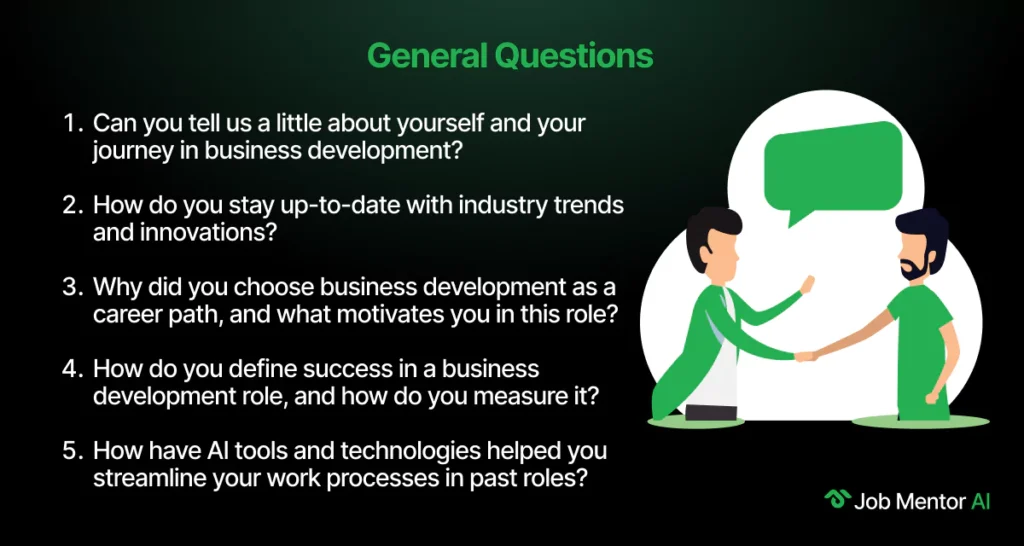
1. Can you tell us a little about yourself and your journey in business development?
Example:
I started in sales, focusing on understanding client needs. Over time, I moved into business development, where I helped companies expand by identifying new opportunities and building partnerships. My experience spans industries like tech and retail, and I enjoy driving growth through strategic market exploration and relationship-building.
2. How do you stay up-to-date with industry trends and innovations?
Example:
I regularly read industry publications, subscribe to newsletters, and attend webinars and conferences. I also follow thought leaders on LinkedIn and engage in online forums to stay informed about emerging trends and technologies, particularly in AI and business development.
3. Why did you choose business development as a career path, and what motivates you in this role?
Example:
Business development combines creativity and strategy, which is why it appealed to me. I’m motivated by the opportunity to solve business challenges, identify growth opportunities, and foster long-term relationships. I enjoy the dynamic nature of the role and the ability to see projects evolve from idea to success.
4. How do you define success in a business development role, and how do you measure it?
Example:
Success in business development is about growing the company’s market share and building lasting client relationships. I measure it through KPIs like revenue growth, client retention, and how well we adapt to market changes. It’s also about the value we bring to clients and the strength of our partnerships.
5. How have AI tools and technologies helped you streamline your work processes in past roles?
Example:
I have used CRM software and project management tools to keep track of client relationships and deadlines efficiently. These tools help me organize my workflow, monitor progress, and ensure that I follow up with clients promptly. By automating routine tasks, I’ve been able to focus more on strategic decision-making and building stronger partnerships.
Questions About Experience and Background
Interviewers more often dig into your past roles to understand how your experience aligns with the demands of a position. These Business Development Manager Interview Questions focus on your previous achievements in another similar organization, They try to gain industry knowledge, and the strategies you’ve used to drive growth.
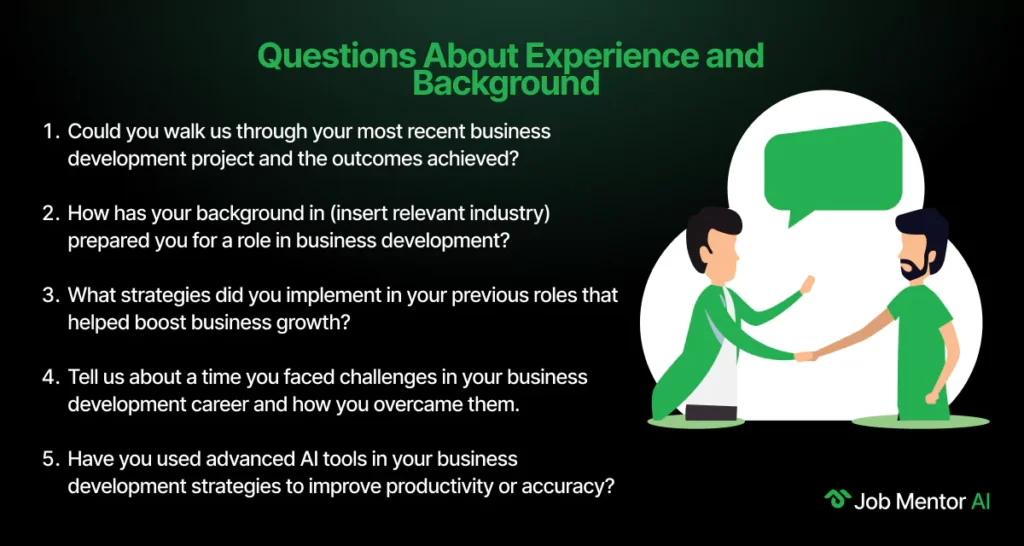
1. Could you walk us through your most recent business development project and the outcomes achieved?
Example:
I worked on expanding our business in the Asia-Pacific region, collaborating with the sales and marketing teams. Through targeted outreach and digital marketing, we saw a 25% increase in leads and strengthened partnerships, resulting in a revenue boost for the region.
2. How has your background in (insert relevant industry) prepared you for a role in business development?
Example:
My background in tech has taught me to adapt to rapid changes and deliver value through innovation. I’ve honed skills in client relationship-building and negotiation, which are crucial for success in business development and identifying new opportunities.
3. What strategies did you implement in your previous roles that helped boost business growth?
Example:
I focused on high-value clients, tailoring our approach to their specific needs. By strengthening relationships and ensuring post-sale support, we saw better retention and repeat business, which contributed to overall growth.
4. Tell us about a time you faced challenges in your business development career and how you overcame them.
Example:
I tackled a competitive market by highlighting our unique customer care and building close relationships with key decision-makers. This approach helped us secure major deals and establish a strong market presence.
5. Have you used advanced AI tools in your business development strategies to improve productivity or accuracy?
Example:
Yes, I’ve used AI to analyze customer data, predict needs, and identify high-potential leads. These tools have made our strategies more efficient and helped us focus on opportunities that offer the greatest return.
Explore these helpful interview guides
Behavioral and Situational Business Development Manager Interview Questions
Employers typically include behavioral and situational scenarios to assess how you handle challenges, make decisions, and interact with clients or teams. These Business Development Manager Questions reveal your problem-solving abilities, communication style, and adaptability in real-world business settings.
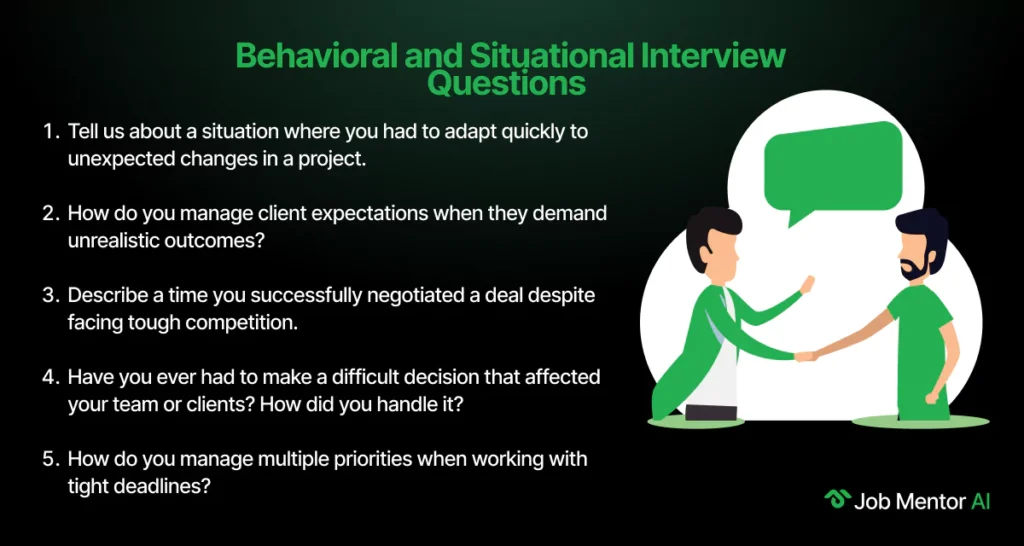
1. Tell us about a situation where you had to adapt quickly to unexpected changes in a project.
Example:
In a recent project, we were working on a proposal when the client unexpectedly changed their requirements. I quickly reassessed the situation, brought the team together, and reallocated tasks based on the new needs. Despite the sudden changes, we were able to adjust quickly, meet the new requirements, and deliver the proposal on time. The client appreciated how quickly we adapted and how well we handled the situation.
2. How do you manage client expectations when they demand unrealistic outcomes?
Example:
When clients have unrealistic expectations, I start by understanding their goals and concerns. I then explain the limitations in a clear and respectful way, offering practical alternatives that still align with their objectives. By focusing on collaboration and setting realistic expectations early on, I can help manage their expectations without damaging the relationship. It’s all about finding a balance between their desires and what’s achievable.
3. Describe a time you successfully negotiated a deal despite facing tough competition.
Example:
I once worked on a deal where we were competing against several strong competitors. I took the time to understand the client’s needs and presented a tailored proposal that focused on the unique value we could offer. I also highlighted the flexibility of our terms, which helped differentiate us from the competition. As a result, the client chose us, not only because of our offer but also because they trusted us to support their long-term goals.
4. Have you ever had to make a difficult decision that affected your team or clients? How did you handle it?
Example:
I faced a situation where we needed to delay the launch of a product due to some technical issues. This decision impacted both the team and our clients, as we had promised the original launch date. After discussing the options with the team, I decided the best course of action was to delay the launch to ensure the quality of the product. I communicated openly with the clients, explaining the reasons for the delay, and they appreciated our focus on delivering a high-quality product.
5. How do you manage multiple priorities when working with tight deadlines?
Example:
When juggling multiple priorities, I assess the urgency and impact of each task. I then create a clear plan, allocating time for each task based on its deadline and importance. I make sure to stay in regular contact with my team to track progress and adjust priorities if needed. By staying organised and focused, I can meet tight deadlines without feeling overwhelmed.
Attention to Detail Business Development Manager Interview Questions
Attention to detail is a key focus area. These Business Development Manager Interview Questions help interviewers evaluate your ability to stay organized, avoid costly mistakes, and deliver high-quality work. Business development roles often involve handling contracts, analyzing market data, tracking leads, and managing multiple tasks with precision.
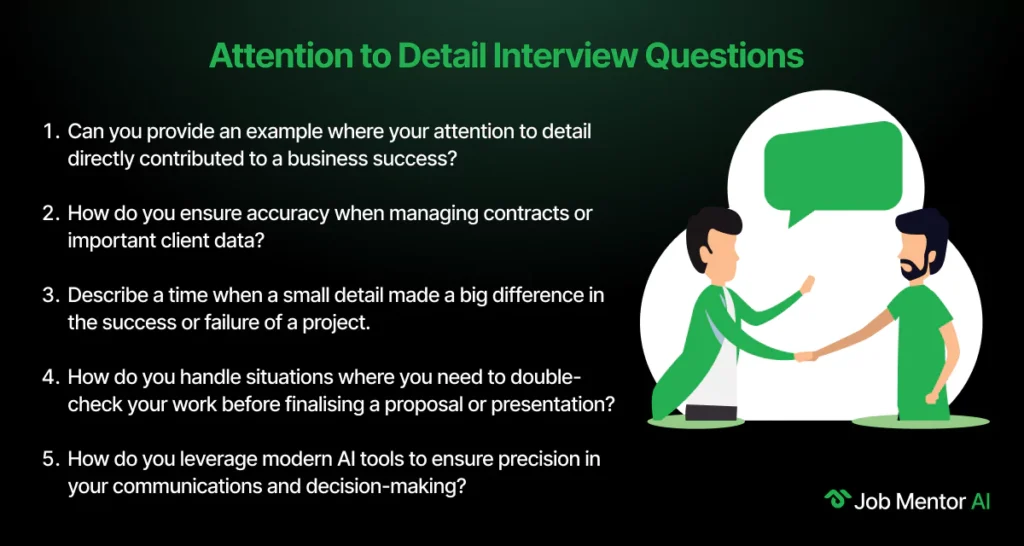
1. Can you provide an example where your attention to detail directly contributed to a business success?
Example:
In a client project, I noticed a minor error in the pricing details just before submission. Correcting it not only saved us from a potential financial issue but also impressed the client with our professionalism. It helped us secure the deal and build long-term trust.
2. How do you ensure accuracy when managing contracts or important client data?
Example:
I take a careful step-by-step approach—review everything twice, cross-check numbers, and use reliable tools to help manage data. I also use AI tools where possible to catch small mistakes and keep everything organised.
3. Describe a time when a small detail made a big difference in the success or failure of a project.
Example:
While working on a marketing proposal, I noticed a competitor’s name was accidentally mentioned in the draft. Catching and correcting that small detail just in time kept the presentation clean and professional, and we ended up winning the client.
4. How do you handle situations where you need to double-check your work before finalising a proposal or presentation?
Example:
I like to take a short break before reviewing, so I can look at things with fresh eyes. I also use checklists and AI tools like AI Interview Assistant to make sure I don’t miss anything before hitting send.
5. How do you leverage modern AI tools to ensure precision in your communications and decision-making?
Example:
I take my time to review all important information before sharing it. Whether it’s a proposal, an email, or a presentation, I make sure everything is clear, accurate, and easy to understand. I also like to keep notes and double-check facts, especially when making decisions that impact the team or clients. Being thorough helps avoid misunderstandings and builds trust.
Planning & Organization Business Development Manager Interview Questions
Planning and organization are critical competencies. This role requires managing pipelines, coordinating outreach efforts, setting goals, and aligning strategies with company objectives. Interviewers ask these Business Development Manager Interview Questions to see how you prioritize tasks, manage time effectively, and stay organized under pressure.
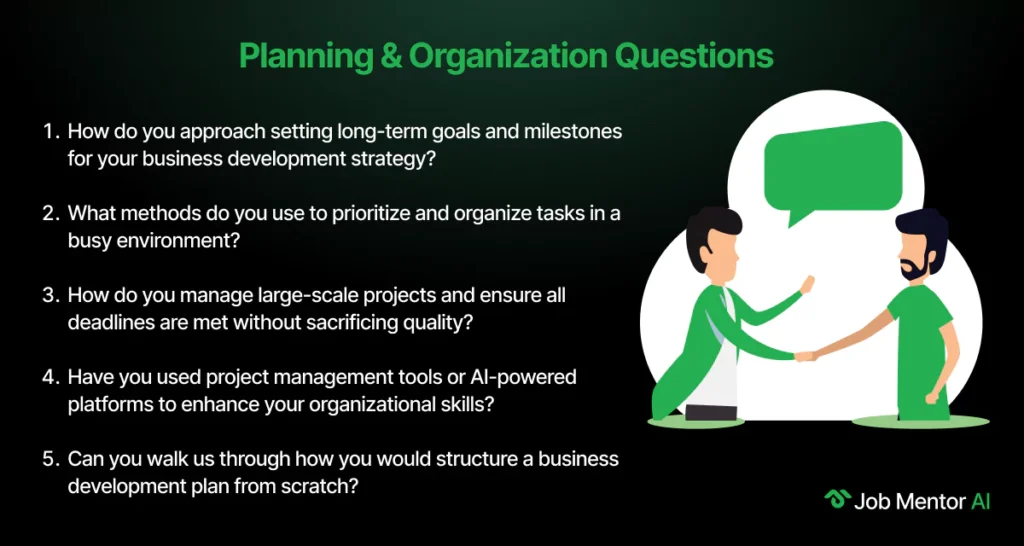
1. How do you approach setting long-term goals and milestones for your business development strategy?
Example:
I start by understanding the company’s overall vision and then break it down into smaller, achievable targets. I focus on setting clear milestones for each quarter, tracking progress regularly, and making adjustments based on market trends or performance insights. This keeps the strategy flexible but focused.
2. What methods do you use to prioritize and organize tasks in a busy environment?
Example:
I usually begin my day by listing out all tasks, then sorting them based on urgency and importance. I use simple tools like to-do lists or calendars to stay on track. For complex tasks, I break them into smaller steps so nothing gets overwhelming. Staying organised keeps me productive, even on the busiest days.
3. How do you manage large-scale projects and ensure all deadlines are met without sacrificing quality?
Example:
I break large projects into smaller phases with clear timelines and responsibilities. Regular check-ins and updates help avoid the last-minute rush. I also built in buffer time for reviews, which helps maintain quality even when deadlines are tight.
4. Have you used project management tools or AI-powered platforms to enhance your organizational skills?
Example:
Yes, I often use tools like Trello, Asana, or other AI-supported platforms to manage tasks, set reminders, and monitor progress. These tools help me stay focused, assign priorities, and ensure nothing slips through the cracks, especially in fast-paced environments.
5. Can you walk us through how you would structure a business development plan from scratch?
Example:
First, I’d research the market and understand our target audience. Then, I’d define clear goals, identify key opportunities, and map out strategies for outreach and partnerships. Finally, I’d set timelines, assign responsibilities, and create a tracking system to measure success and adjust as needed.
Leadership and Team Collaboration Business Development Manager Interview Questions
In this role, you’re expected not only to drive individual results but also to lead cross-functional teams, inspire others, and build strong internal and external partnerships. Interviewers ask these Business Development Manager interview questions to look for examples that highlight your ability to lead by example, resolve conflicts, and foster a collaborative environment.
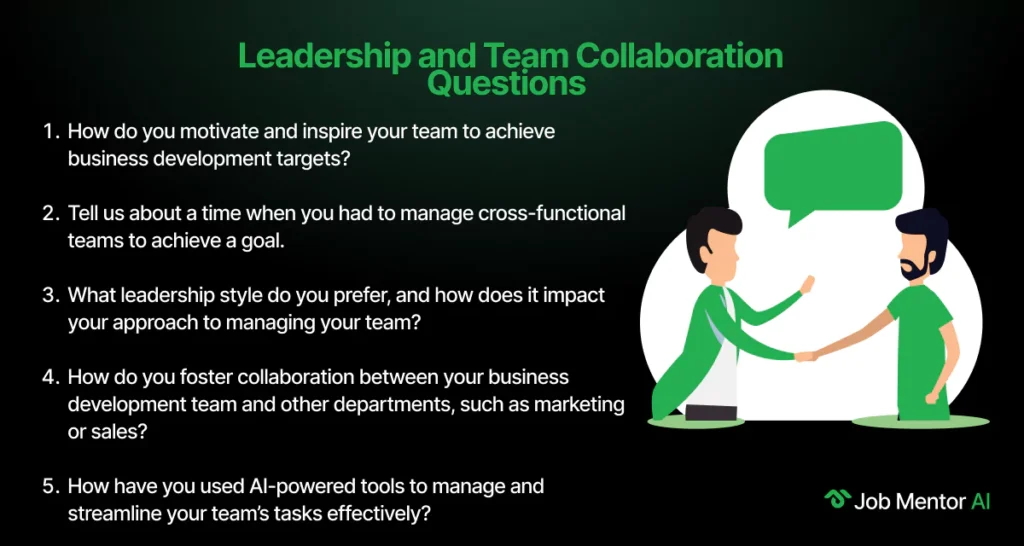
1. How do you motivate and inspire your team to achieve business development targets?
Example:
I believe in open communication and setting clear goals. I make sure the team knows how their work contributes to the bigger picture. Recognising small wins and offering regular support helps keep everyone motivated and moving forward.
2. Tell us about a time when you had to manage cross-functional teams to achieve a goal.
Example:
In one project, I worked closely with marketing and product teams to launch a new service. I made sure everyone was on the same page by setting shared goals, holding regular check-ins, and keeping communication clear and focused. It helped us meet the launch deadline smoothly.
3. What leadership style do you prefer, and how does it impact your approach to managing your team?
Example:
I prefer a collaborative and supportive style. I like to involve the team in decision-making and encourage their ideas. This approach builds trust and helps people feel more connected and responsible for the outcomes.
4. How do you foster collaboration between your business development team and other departments, such as marketing or sales?
Example:
I focus on regular communication and shared planning. We often have joint meetings to align on goals and timelines. This way, everyone understands each other’s roles, and we can support each other more effectively.
5. How have you used AI-powered tools to manage and streamline your team’s tasks effectively?
Example:
Tools like AI Interview Assistant and project dashboards help us stay on top of workloads, delegate tasks better, and track progress in real time. It saves time and makes teamwork more efficient, especially when managing multiple campaigns.
Problem-Solving and Critical Thinking Business Development Manager Interview Questions
Whether it’s resolving client objections or identifying new market opportunities, your ability to think strategically and act decisively can make or break business growth. These Business Development Manager interview questions aim to reveal your thought process, resourcefulness, and how well you can drive results under pressure.
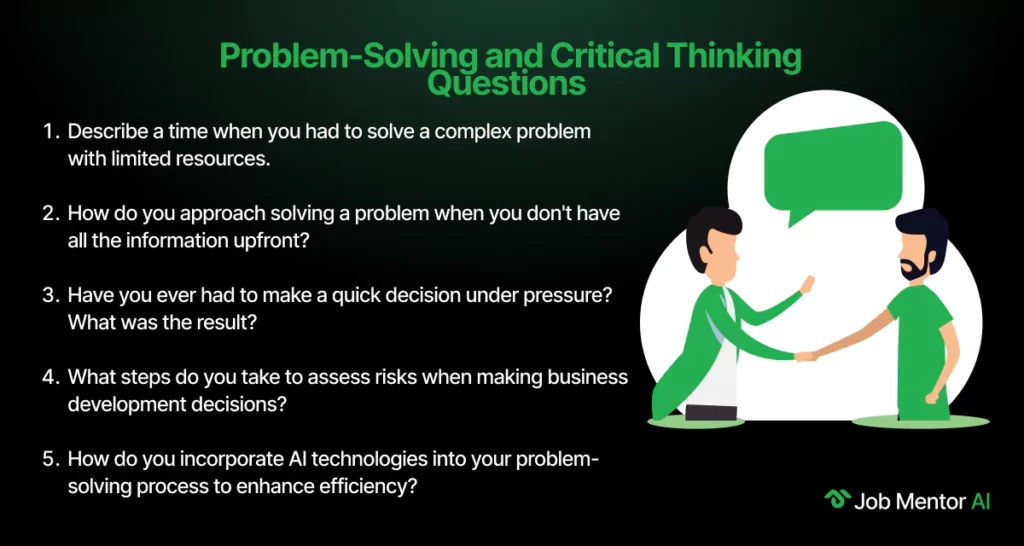
1. Describe a time when you had to solve a complex problem with limited resources.
Example:
We once had to launch a new outreach campaign with a tight budget. I focused on low-cost, high-impact strategies like email and partnerships. By making smart choices and tracking results closely, we managed to exceed our engagement goals without overspending.
2. How do you approach solving a problem when you don't have all the information upfront?
Example:
I start by gathering as much relevant data as possible, even if it’s limited. Then I look for patterns, ask questions, and talk to others for insight. I make a decision based on what’s available, and stay ready to adjust as new info comes in.
3. Have you ever had to make a quick decision under pressure? What was the result?
Example:
Yes, during a client pitch, unexpected changes came up last minute. I had to quickly shift our presentation to highlight different strengths. The quick thinking paid off we secured the deal by showing flexibility and understanding their real needs.
4. What steps do you take to assess risks when making business development decisions?
Example:
I look at both short-term impact and long-term outcomes. I review data, consider potential challenges, and speak with the team. This helps weigh the pros and cons so we can make thoughtful, low-risk decisions.
5. How do you incorporate AI technologies into your problem-solving process to enhance efficiency?
Example:
I use AI-powered tools to analyse data trends, generate solutions quickly, and support decision-making. Whether it’s reviewing competitor activity or crafting client responses, these tools help reduce time spent on repetitive tasks and increase accuracy.
Enhance Your Interview Skills with AI Interview Assistant
With AI Interview Assistant is a great way to boost your interview preparation. It gives you personalized feedback on your responses, enabling you to refine your answers and focus on areas that need improvement. By simulating real interview conditions, this tool helps you get comfortable with interview scenarios and builds your confidence. With tailored guidance, you’ll be fully prepared to succeed in your business development interview.
Boost your preparation today! Try AI Mock Interview Practice and perfect your interview skills!
35 Business Development Manager Interview Questions You Must Prepare
Table of Contents
Recommended Resources

Top 40 Digital Signal Processing Interview Questions
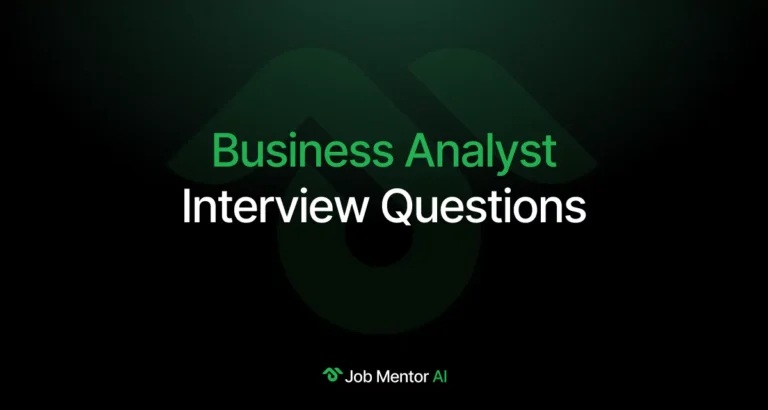
Business Analyst Interview Questions
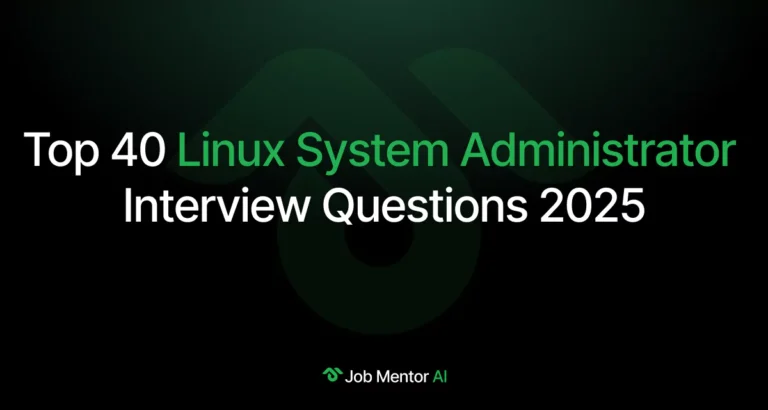
Top 40 Linux System Administrator Interview Questions 2025
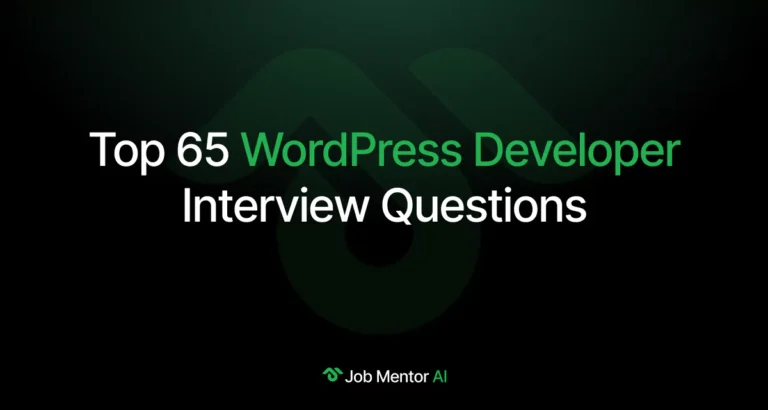
Top 65 WordPress Interview Questions and Answers 2025
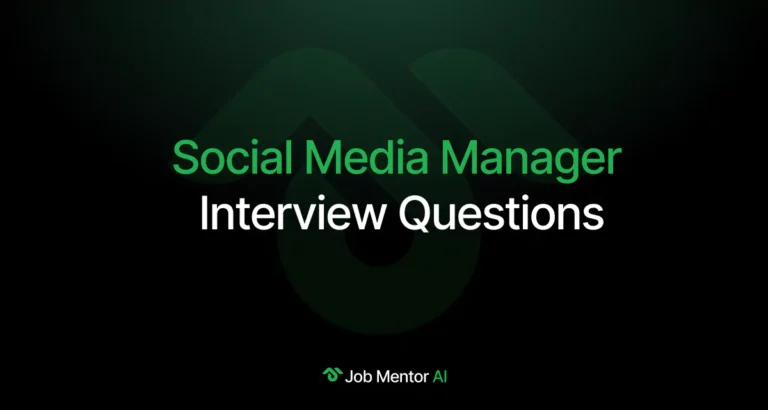
Social Media Manager Interview Questions
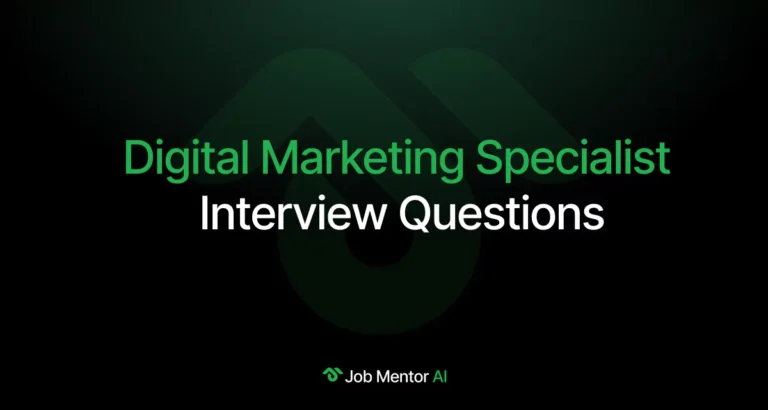
Digital Marketing Specialist Interview Questions
